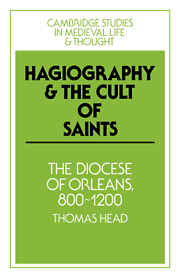Book contents
- Frontmatter
- Contents
- List of figures and maps
- Acknowledgements
- List of abbreviation
- INTRODUCTION
- 1 THE CAROLINGIAN PERIOD
- 2 THE CAPETIAN PERIOD
- 3 THE IDEAL OF SANCTITY: FORMATION, IMITATION, AND DISSEMINATION
- 4 THE POSTHUMOUS PATRONAGE OF THE SAINTS
- 5 SAINTLY PATRONAGE AND EPISCOPAL AUTHORITY AT THE ABBEY OF MICY
- 6 SAINTS, ABBOTS, AND ECCLESIASTICAL POLITICS AT FLEURY AND PITHIVIERS
- CONCLUSION
- Bibliography and references
- Index
4 - THE POSTHUMOUS PATRONAGE OF THE SAINTS
Published online by Cambridge University Press: 22 September 2009
- Frontmatter
- Contents
- List of figures and maps
- Acknowledgements
- List of abbreviation
- INTRODUCTION
- 1 THE CAROLINGIAN PERIOD
- 2 THE CAPETIAN PERIOD
- 3 THE IDEAL OF SANCTITY: FORMATION, IMITATION, AND DISSEMINATION
- 4 THE POSTHUMOUS PATRONAGE OF THE SAINTS
- 5 SAINTLY PATRONAGE AND EPISCOPAL AUTHORITY AT THE ABBEY OF MICY
- 6 SAINTS, ABBOTS, AND ECCLESIASTICAL POLITICS AT FLEURY AND PITHIVIERS
- CONCLUSION
- Bibliography and references
- Index
Summary
SAINTLY PATRONAGE AND THE COLLECTION OF MIRACLE STORIES
As the authors of the lives of the ‘fathers’ of the Orléanais stressed, the virtus which those saints had exhibited during their lifetimes continued to be efficacious posthumously at the shrines containing their relics. Bertholdus of Micy wrote, ‘The exercise of spiritual powers, in which the saints once exerted themselves either bodily or spiritually … even today does not cease to show forth around their remains.’ While a living holy person had numerous ways in which to exercise virtus, such as asceticism and teaching the monastic life, the posthumous exercise of that virtus was virtually synonymous with miracles. Odo of Cluny echoed Bertholdus in the mid-tenth century when he preached to the monks of Fleury, ‘The Holy Spirit adorns [St Benedict] spiritually both with the signs of miracles and with the exercise of powers in order that he, through whom [the Holy Spirit] has placed the multitude of the higher order under a rule, might now appear worthy in the world.’
The monks of Fleury took the presence of Benedict in their house seriously and literally. Odo's biographer related how one had been confronted by St Benedict himself in front of the abbey's gates. The saint had ordered him, ‘Go and tell the brothers that, since they give me no peace, I am going to leave these buildings.’ The purpose of the saint's journey was to bring Odo, a renowned reformer, to the house.
- Type
- Chapter
- Information
- Hagiography and the Cult of SaintsThe Diocese of Orléans, 800–1200, pp. 135 - 201Publisher: Cambridge University PressPrint publication year: 1990



